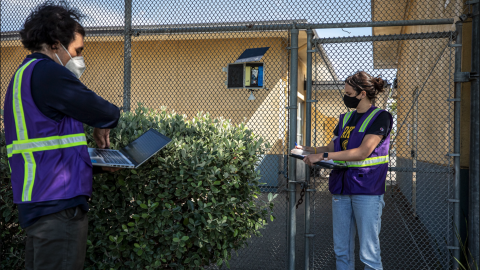The Challenge
Vulnerable communities are most at risk from the effects of climate change globally, and the steps we take to tackle the climate crisis and move away from our dependence on fossil fuels must result in affordable energy access for all and equitable distribution of the benefits of those energy and climate investments.
How are we making a difference?
The Energy Technologies Area (ETA) prioritizes equity and energy justice in how we conduct our research and how we share our results. Our researchers recognize the need to conduct research and demonstrations at the community level, with input from and the participation of community partners, to align with community goals and values.
ETA scientists have several demonstration projects that prioritize low-income and disadvantaged community accessibility to new energy technologies and strategies. Our research strategies will continue to expand the role of equity and energy justice by developing technologies that foster community resilience, increase equity in transportation electrification, and decarbonize manufacturing and the grid.
Mobility Modeling for Low-Income Communities
Our mobility modeling research is targeted at ensuring access to clean transportation for multi-family housing communities. Modeling individual decisions such as where and how to travel, and all of the interactions between travelers and mobility providers as they make them, allows researchers at Berkeley Lab to evaluate ways to ease congestion and improve mobility in the short term and to understand the long term implications of new technologies and travel patterns on energy use and city environments.
To capture the operations of transportation systems in full detail, a joint effort between Berkeley Lab and the Institute for Transportation Studies at UC Berkeley has developed the Behavior, Energy, Autonomy, and Mobility (BEAM) Modeling Framework. This modeling framework incorporates four key components of metropolitan transportation systems: Behavior, Energy, Autonomy, and Mobility, enabling highly resolved simulations of current future mobility systems.
BEAM can simulate mobility decisions of individual travelers based on their socio-economic and demographic characteristics including EV charging behavior and interactions with charging infrastructure or provide detailed analyses of the energy impacts of changing mobility trends. BEAM harnesses cutting-edge concurrent computing technology to enable simulation of millions of agents and is at the forefront of modeling traveler behavior and the operations of emerging transportation modes.
CAL-THRIVES
A California Toolkit for Heat Resiliency in Vulnerable Environments
In collaboration with community stakeholders in the city of Fresno, California, our researchers have helped vulnerable communities in Fresno develop scalable blueprints for resilience and community cooling centers. Collecting and responding to community feedback was an important component of developing this toolkit.
Air Quality
Vehicle Air Pollution Emission Control Technologies
Heavy-duty diesel trucks are essential for the movement of goods in California and the nation, but they contribute significantly to the burden of diesel particulate matter and nitrogen oxides in the air. Nitrogen oxide emissions are linked to significant health impacts, and many low-income communities who live and work in close proximity to these sources of pollution have been more significantly impacted by these emissions. Berkeley Lab and UC Berkeley scientists work together to lead research in measuring the performance and durability of after-treatment emission control technologies as well as effectiveness of vehicle inspection and maintenance programs in reducing emissions from other vehicle types in compliance with EPA standards.
Connecting with the community and hearing the voices of those who are most at risk from the effects of climate change is paramount to creating technologies and solutions that will have real-world impact. Our researchers include community participation in their studies in order to better inform research requirements.
Ecoblock
Transforming Cities for a Resilient and Carbon Neutral Future
In partnership with the local community and UC Berkeley, ETA researchers helped design the Oakland EcoBlock, featuring affordable block-level retrofit strategies for energy efficiency measures, electrification, and distributed energy resources (DERs) via a community scale microgrid.
Climate 2.0
Ensuring Climate Equity
From access to clean energy to home retrofit and weatherization improvements to electric vehicle adoption, ETA researchers examine current policies and strategies that specifically impact low-income communities.
Based on a thorough analysis of the barriers impacting low-income community access to clean, renewable energy and technologies, ETA researchers provided a set of recommendations to overcome these hurdles and achieve climate equity and environmental justice. Their main recommendations include:
- transforming the heavy-duty vehicle fleet to zero emissions vehicles, which will have an enormous impact on improving air quality for low-income communities;
- enabling more frequent multi-family building retrofits, weatherization and upgrades to newer technologies such as LED lighting, smart thermostats, and more energy-efficient heating and cooling equipment; and
- creating policies and financing options that help accelerate the adoption of electric vehicles in low-income communities.

Air quality sensors are available to the public, but inequities in their adoption remain.

Berkeley Lab study shows how battery-electric trains can deliver environmental justice, cost-savings, and resilience to the U.S.

Berkeley Lab report outlines systemic changes needed to advance equity in electric utility regulation


